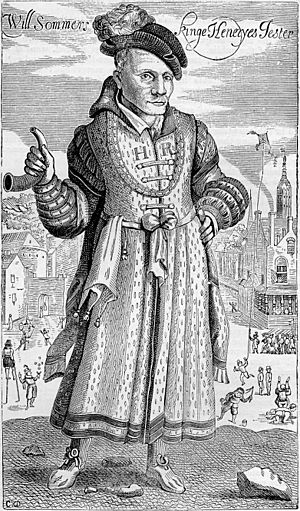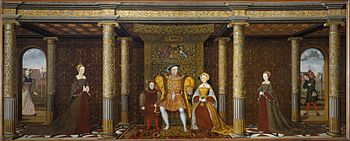Will Sommers facts for kids
William Sommers (also known as Will Somers or Somer) was a very famous court jester for Henry VIII of England. He was known for his clever jokes and for being able to cheer up the King. People at the time sometimes called jesters like him "natural fools," which meant they were thought to have intellectual disabilities. However, these jesters were often highly valued and given special roles in the royal court. Will Sommers died on June 15, 1560.
Contents
Will Sommers' Early Life
Will Sommers was likely born in Shropshire, England. Not much is known for sure about his early life. He first came to the attention of Richard Fermor, a merchant who worked in Calais. In 1525, Fermor brought Will to Greenwich to meet King Henry VIII. Will is first officially mentioned in the King's records in June 1535.
Life as a Royal Jester
Will Sommers worked for King Henry VIII for the rest of the King's life. As Henry VIII got older and suffered from a painful leg problem, it was said that only Will could make him feel better and laugh.
Will was more than just a comedian; he was also seen as honest and trustworthy. Important people like Thomas Cromwell, a chief minister to the King, liked how Will would sometimes use jokes to point out when the royal household was spending too much money or wasting things.
The Role of a "Natural Fool"
In Tudor times, "natural fools" were people believed to have intellectual disabilities who were often part of royal courts and wealthy families. They were given support and had a special place in society. These individuals were allowed to speak freely, even to the King, without needing to be as formal as others.
Will Sommers was known for his sharp wit. He even joked with powerful figures like Cardinal Wolsey. However, sometimes he went too far. In 1535, the King even threatened him after Will was dared to say rude things about Anne Boleyn, who was Queen at the time, and her daughter, Princess Elizabeth.
Will's Clever Pranks
Robert Armin, a writer from that time, shared a story about how Will Sommers once played a trick on Thomas, the King's juggler. Will interrupted Thomas's performance carrying milk and a bread roll. He asked the King for a spoon, and when the King said he didn't have one, Thomas told Will to use his hands. Will then sang a funny song and threw the milk in Thomas's face before running out. After that, Thomas was never seen at court again.
Will also used his influence to help others. He once subtly convinced King Henry to help his uncle, who had lost his land because of new laws about common land.
In a book called Arte of Rhetorique (written between 1553 and 1560) by Thomas Wilson, Will is quoted telling the King, who was having money problems, that he had "so many Frauditors [auditors], so many Conveighers [surveyors], and so many Deceivers [receivers] that they get all to themselves." This was a clever way to suggest that the King's own staff might be taking too much money.
How Will Sommers Was Shown in Art
Many people believe Will Sommers is shown in a famous painting of Henry VIII and his family. This painting was made around 1544–1545 by an unknown artist and shows Will on the far right. Will also appears with Henry VIII in the Psalter of Henry VIII, a special book made for the King, which is now kept in the British Library. In 2008, another picture showing Will Sommers was found at Boughton House in Northamptonshire.
Today, some entertainers dress up as 'Will' and perform at Renaissance-themed events, like Renaissance fairs.
Life After King Henry VIII
After King Henry VIII died, Will Sommers stayed at the royal court. He eventually retired during the time of Elizabeth I.
Under Queen Mary I, Will's job was mostly for ceremonies. He also worked alongside Mary's own jester, Jane Foole. It was said that Will was one of the only people, besides John Heywood, who could make Queen Mary laugh. Will's last public appearance was at the coronation of Elizabeth I.
Will Sommers' Death
Will Sommers likely died on June 15, 1560. His death is recorded in the parish of St. Leonards, Shoreditch. There is a plaque in the church today that remembers his burial there.
Will Sommers in Books and Shows
William Sommers has appeared in many plays, books, and TV shows over the years:
- In 1592, Thomas Nashe wrote a play called Pleesant Comedie called Summers last Will and Testament.
- Samuel Rowlands wrote about him in Good Newes and Bad Newes (1622).
- A popular story about his life, A Pleasant Historie of the Life and Death of William Sommers, was reprinted in 1794.
- Howard Goorney played Will Sommers in two episodes of the 1970 BBC mini-series The Six Wives of Henry VIII.
- In Margaret George's 1986 book The Autobiography of Henry VIII, Will Somers protects the King's writings and adds his own thoughts.
- Comedian Roy Hudd played Will Sommers in a 1995 BBC Radio 2 show called Crowned Hudds.
- Will Sommers is an important character in The Queen's Fool, a 2004 historical novel by Philippa Gregory. In this book, he mentors a fictional jester named Hannah Green.
- David Bradley played Will Sommers in an episode of the Showtime series The Tudors (2009). In this show, he is shown as an older, wise attendant to the King.
- In April 2016, actor Pierre Brault created a solo show called Will Somers: Keeping Your Head, which explores Will's life and how comedy can challenge powerful people.
- Will Somers is the main character in the historical novel The Last of Days by Paul C. Doherty.
- He is also the main character and narrator in Shelly Talcott's 2017 novel Fall of the House of Queens: Book One of The Shattered Rose Series. In this story, he is a trusted friend to Henry VIII and his wives, even though he is shown as a hunchback (which he was not in real life).
 | Jewel Prestage |
 | Ella Baker |
 | Fannie Lou Hamer |



